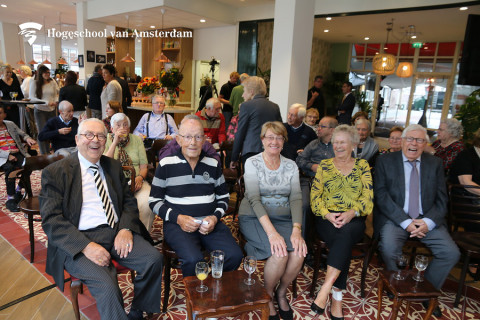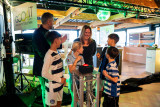The Amstelhuis functions both as a residential facility for senior citizens in Amsterdam and as an excellent practical environment for students, lecturers and researchers of the Amsterdam University of Applied Sciences (AUAS).
> Next step: forms of housing for Turkish and Moroccan elderly people
On 21 March 2017, a policy meeting was held by Amstelhuis Cocon Vastgoed Zorg and the Amsterdam University of Applied Sciences. Central to this meeting was the subject “forms of housing for Turkish and Moroccan elderly people”.
Representatives of Cocon Vastgoed Zorg, professors and researchers from the Amsterdam University of Applied Sciences and representatives from “Wijkadvies” (Community Advice) considered various forms of housing for these specific groups. This resulted in unique concepts and ideas, to serve as recommendations for Cocon Vastgoed Zorg:
• Create small housing units with 30 to 40 residents, two separate spaces for, respectively, Turkish and Moroccan seniors.
• Each space has a transitional space and a bridging function to the general and the public spaces.
• Relationships with children and grandchildren appear to be essential. Set up the space in such a manner that contact with family is possible and attractive.
We hope to jointly work out the ideas in further detail in the future.
_________________________________________________________________________________
Een Nieuwe Start - Het Amstelhuis (subs)
Het Amstelhuis 2 - Living Together
VITAMINE
_________________________________________________________________________________
Contact
For more information, contact Ellen Budde - projectleader Amstelhuis (e.budde@hva.nl).
What is the goal of the project?
Based on the belief that a safe and close social environment contributes to the well-being of the residents, the research programme Urban Vitality and the Amstelhuis have been working together since 2015. Central importance is placed on activity, nutrition and social cohesion, with special attention for the residents’ own strength and self-management.
What is the result of the project?
Students, lecturers and researchers from the faculties of Health (FH), Applied Social Sciences and Law (FASSL), Sports and Nutrition (FSN), and Digital Media and Creative Industries (FDMCI) collaborate in interdisciplinary teams on various projects for research and other purposes. This collaboration produces research, projects and activities for the residents.
ONGOING PROJECTS
• Falls are the most common cause of accidental injuries among the elderly. Exercise Therapy students therefore give weekly lessons in Fall Prevention, and a study into fall prediction was performed. The purpose of the training and the study is to prevent and predict falls to allow for quicker action in the future and to make elderly people feel more confident in terms of their postural stability. The study showed that In Balans is the most suitable training programme for the residents of the Amstelhuis. In addition to giving the Fall Prevention training, Exercise Therapy students are studying physical activity among the elderly while waiting for the approval of the application for a four-year subsidised study of this subject.
• Healthy nutrition for the elderly is a frequent subject in research, information and advice. As part of The Food Lab HvA, students of Nutrition & Dietetics perform research into this subject. Sustainable products, protein-rich food and taste experience are key. Together with the residents’ club of the Amstelhuis, The Food Lab organises meetings where residents can taste sustainable and vegetarian products. Furthermore, The Food Lab is researching what can be done to make the restaurant more attractive for elderly people living in the neighbourhood.
• For the vitality of the residents, it is important they have a social network of co-residents, family and friends. Research by Occupational Therapy students shows that some of the residents find it difficult to connect with the residents upon moving into the Amstelhuis. Students investigate what assistance is desired to help strengthen the social network of new residents where necessary in the first weeks. In keeping with this, students of the minor in Social Inclusion are researching how residents can support and help each other.
COMPLETED PROJECTS
• Estimating fall risk is important for achieving timely and targeted intervention. The BRAVO project developed new knowledge about technology that allows the estimation of fall risk in realistic environments. Measurements were carried out to study the movement patterns and fall risks of pensioners. This was done using digital measurement equipment set up in residential environments to record the daily activities of residents.
• For which residents does the Amstelhuis present a suitable living environment? This was the key question in a study by Occupational Therapy students into the acceptance procedure of the facility. Based on this study, the procedure was expanded with more attention for the community that is the Amstelhuis and for the ambition to create a pleasant community together.
• The VITAMINE study developed a home exercise programme for the elderly for the improvement of their daily physical functioning. AUAS-students acted as coaches, and offered lessons in exercise. Subsequently, the study investigated the effects of additional functional exercise programmes combined with a protein-rich diet.
Who initiated the project and which organizations are involved?
The Amstelhuis is a residential facility in Amsterdam containing 120 social housing units for persons aged 70 and over with a need for light care. They live there independently and can use the residents’ club on the ground floor. With a bar, restaurant and library, this residents’ club offers a meeting place for both the residents and elderly people living in the neighbourhood.
The basic idea of the Amstelhuis is to enable its residents to live independently as long as possible in a pleasant environment where they can meet other seniors and take part in activities. To make this possible, the residents and the management of the Amstelhuis are working in conjunction with the Amsterdam University of Applied Sciences (AUAS).






Hi there! Great initiative!
We are hosting this year's European Robotics Week in Amsterdam, "Robots at your Service", for the purpose to prolong independent living. https://amsterdamsmartcity.com/projects/robots-at-your-service-active--healthy-ageing
I see a great fit with your program and suggest we meet soon to discuss possible collaboration!